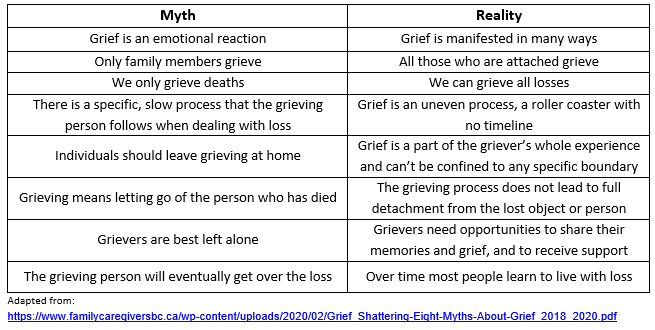Author: Sarah Borg, Dip. HE (Melit.); B.A. (Hons) (Melit.)
As we commemorate all souls during the month of November, this article tackles the topic of grief, which, as we will see, can also be a response to other forms of losses than the physical death of a loved one.
Definition of Grief and Types of Losses
The American Psychological Association defines grief as “the anguish experienced after a significant loss, usually the death of a beloved person.” There are, however, other forms of losses that a person may experience, namely the loss of a job, the loss of dreams or aspirations, the loss of a relationship or friendship, the loss of a pet, a loved one, the loss of safety, faith, health and even the loss of meaning in life.
Myths Debunked
The following are 8 myths set against reality:

Potential responses
In the face of loss, the responses can vary from one person to the other. The phenomenon of loss can be so impactful that the response can be multifaceted, taking on different forms in various situations. Moreover, the grief can sometimes be masked, felt only subtly, otherwise felt overtly on a full-blown scale.
Among the various emotions associated with grief, we can mention: sadness, shock, denial, numbness, anger, guilt, and blame. No emotion is right or wrong, it just is.
As for behaviour, loss can also lead a person to introduce or give up particular activities. For instance, a person might start withdrawing from social activities; they might start abusing from substances or engaging in self-harm as a way of coping with the sense of emptiness that they would be experiencing.
A grieving person can also be affected physically, namely by experiencing a weakened immune system, a significant weight loss or weight gain, change in sleeping patterns, unusual body aches, and the like.
Spiritually, a person may also undergo a change, namely by having recurring dreams about the lost person, feeling their presence or even hearing their voice. It is common for grieving persons to be in search of more meaning and purpose in their lives and to revisit their religious faith or spiritual beliefs.
Post-traumatic growth
Experiencing a loss can be traumatic, but that does not necessarily mean that the person experiencing the loss cannot adapt well to the change. There are people who manage to cope and move forward without the lost person or object, adopting a newfound meaning and purpose as they reframe their situation. In such cases, according to Tedeschi and Calhoun (2004), the person would be experiencing post-traumatic growth, a positive change deriving from the very struggle with a highly stressful life event.
How therapy can help the griever
Therapy creates the right conditions for the griever to process the loss.
The professional cannot make the griever process the loss. But the right conditions can be created by the professional so that the griever can:
- feel safe voicing their current emotional state
- be non-judgemental towards the various emotions that the loss may trigger in them
- feel supported and cared for
- focus on the things and persons that are still present, instead of those that have been lost
- explore activities that provide more meaning, pleasure and a sense of purpose
- break down this big life event into bite-sized challenges that can be faced and managed
- remember the value of remaining in touch with supportive people
- remember the importance of making time for themselves to process their feelings while remaining grounded, by carrying out daily tasks and taking care of their physical wellbeing.
How you can support a grieving person
- Reach out to check in or to invite the griever for some quality time together
- Be available, pay attention and listen even to that which is not being said.
- Offer practical help such as babysitting, shopping for groceries, etc
- Be present in the long-term – anniversaries and birthdays may be especially difficult for the griever
- When you are listening to the grieving person, avoid cliches, offering advice or giving your interpretation about the matter. A supportive shoulder and an empathic look might be all that the grieving person would need.
References
Tedeschi, R. and Calhoun, L. (2004). Posttraumatic Growth: Conceptual foundations and
empirical evidence. Psychological Inquiry, 1-18. doi: https://doi.org/10.1207/s15327965pli1501_01
American Psychological Association. Grief. https://www.apa.org/topics/grief
This project has been funded by the Small Initiatives Support Scheme (SIS) managed by the Malta Council for the Voluntary Sector (MCVS) supported by the Ministry for Inclusion, Voluntary Organisations and Consumer Rights (MIVC). This project/publication reflects the views only of the author, and the MCVS cannot be held responsible for the content or any use which may be made of the information contained therein.







